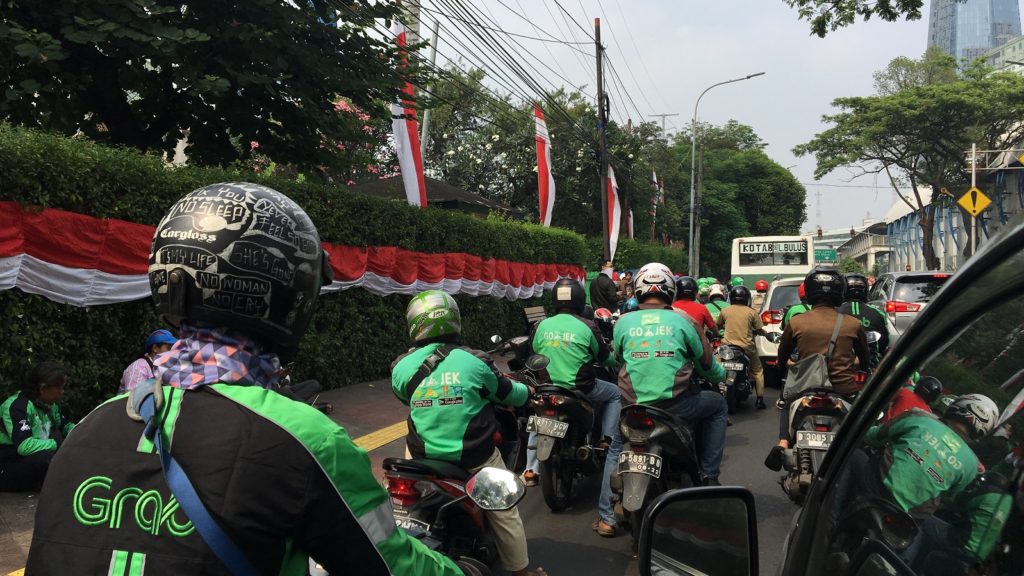Four young scientists, accompanied by Eskom Expo’s Business Manager, Mmamoloko Rancia Riba, won their place to represent the country at the Indonesia competition, renowned…
Indonesian unicorn shows Silicon Valley model can’t beat going local [Opinion]

It is said that Jakartans spend 10 years of their life in traffic. The populous and fast growing Indonesian capital city is a sweaty, gridlocked cacophony of just about every type of vehicle you can think of.
It’s a problem that has been noticed, and tackled, by the region’s tech entrepreneurs. To this end, two massive tech “unicorns” dominate the ride-hailing market there.
Both companies, Go-Jek and the Singaporean Grab, are effectively the Ubers of that region.
In fact, both companies have been so successful that they brought the worldwide ride-hailing leader Uber to its knees, forcing the San Francisco company to effectively bow-out as a standalone company at the beginning half of this year.
This is no small deal. Indonesia, with more than 260 million people, is the fourth most populous country in the world. The entire Southeast Asia region where Uber waved the white flag (by closing shop and taking a minority stake in rival Grab) is a market of about 620 million people.
One of the biggest criticism of tech startups is that they create businesses with a Silicon Valley mindset
And in this the tale of faraway Jakarta is a lesson for tech entrepreneurs here in South Africa, and everywhere in the world.
Local vs Silicon Valley
One of the biggest criticisms of tech startups is that they create businesses with a “Silicon Valley mindset”. Entrepreneurs, tech entrepreneurs in particular, often specialise in creating high-tech copies that are just irrelevant for the local market.
It is something venture capitalists look for in businesses. When assessing a potential investment, a key question venture capitalists ask is: “What is your competitive advantage?” or even “What is your unfair advantage?”
They are looking for that thing that will make your business special and make it fly (and therefore make a return on investment).
We all know the internet is international and it’s a dream to create a global business and travel the world. But these are hard to do, and in most cases it’s better to stick to the market you know, understand, and have your network in. It’s the market you have a competitive advantage in, why would you throw that away?
Woven into South Africa’s local idiosyncrasies and complexities, is the local entrepreneur’s worldwide competitive advantage. To not see this, is to squander your biggest headstart.
Entrepreneurs often note with despair that strong, well-funded multinational companies have already moved into their local market and are completely dominating the sector.
In South Africa we have Uber (transport), Google (search and advertising), Netflix (video streaming), Facebook (social media and online advertising) and many others.
So how can we compete with the great Uber, they ask?
Go-Jek’s answer
Well, in Jakarta, the Go-Jek founders had some answers. From the very start, the Indonesian company reasoned that the best way to address the city’s traffic jams were to bet on the more affordable and appealing ojek (or motorcycles) rather than cars.
GoJek also offers cars, but nimbly teamed up with a 20 000-car-strong local taxi provider, rather than start from scratch.
To ensure its vehicles were used beyond rush-hour traffic, Go-Jek then switched on about 18 other on-demand services, quickly expanding beyond ride hailing to include delivery services involving food, grocery, medicine, ticketing, general logistics, cleaning services — even massage and beauty options.
There is a South African twist to this impressive story. Via its Tencent stake, Naspers is an indirect shareholder in the company.
And what a stake it is: the fast-growing eight-year-old “startup” is now worth about $5-billion, is recognised as one of Indonesia’s top 10 brands and appears at number 17 in Fortune’s list of 50 companies that Change the World, alongside tech titans like Microsoft and Apple.
Solving SA problems
Go-Jek teaches us that the great local startups of the future will be those that solve real South African problems. And there are some great local startups doing just that.
For example, the five-year-old Cape Town startup Sweepsouth aims to improve and disrupt the hiring process in the informal domestic worker sector through technology.
There is Luvuyo Rani’s Silulo Ulutho Technologies, which incubates and educates township entrepreneurs.
Snapscan is a mobile payment solution company that facilitates transactions in a range of sectors and industries, but it has filled a particularly useful micro-payments niche allowing parking attendants to collect money.
Noting that 75% of the population in sub-Saharan Africa live and work in areas that have limited access to goods and services, logistics startup Pargo provides last-mile courier services to companies for those hard-to-reach informal areas.
Spazapp is a funded Durban-based company whose android application connects a community of informal traders directly to big FMCG companies like Unilever and Tiger
Brands.
In the healthtech space, Vula Mobile connects healthcare workers in remote areas and the patients they serve to medical specialists, speeding up the referral process.
These are just a few of many local startups solving real South African problems. We need more of them.
*An online article is never complete. Have we left off a very worthy startup in this article? Please let us know in the comments below and we’ll consider adding them.
Matthew Buckland is an investor, entrepreneur and the founder of Ventureburn.com This column was first published in his regular column on Business Day.
Featured image: Grab and Go-Jek motorcycle drivers pictured in a busy Jakarta street (Supplied)


